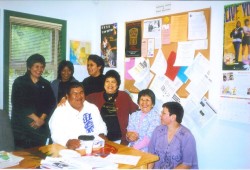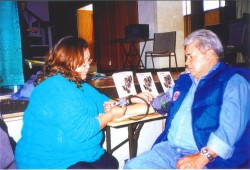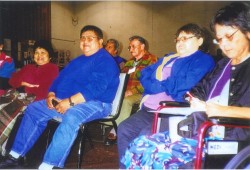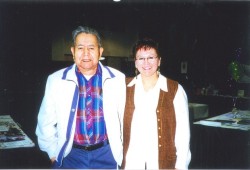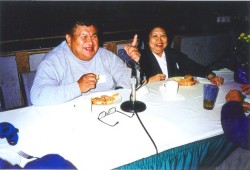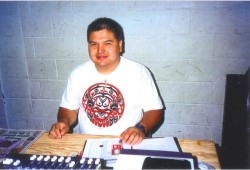Organizers of a health fair for Nuu-chah-nulth-aht are urging people to reach out to elders and those with disabilities to ensure isolation doesn’t worsen amid challenges tied to the COVID-19 pandemic.
As with just about any annual gathering these days, the Disability Access Awareness Committee (DAC) Health Ability Fair has been cancelled due to the risk of coronavirus exposure during the large, two-day event. For several years the DAC fair has provided a format for information sharing to help those with disabilities or health challenges. The event also acts as a forum for Nuu-chah-nulth to bring their health-related concerns to participating providers, covering a variety of topics ranging from diabetes or heart disease to mental health or available benefits.
Tseshaht elder Helen Dick has been involved with the Disability Access Awareness Committee since the initiative began 22 years ago and serves as chairperson. She finds that the health fair’s cancellation brings more reason than ever for people to check on their elderly loved ones as COVID-19 preventative measures have forced many seniors inside.
“That should not prevent family and relatives to phone the elder,” she said. “People with disabilities, keep in touch with them. You can put a package of some kind together, put it on their doorstep, let them know that you’re there for them if they need help.”
DAC Coordinator Florence Wylie noted that those who would most benefit from the health fair are particularly vulnerable to isolation.
“What we’ve observed over the years is that quite often many people with disabilities spend a lot of time alone,” she said. “We have heard stories of the feelings of sadness, loneliness, they have disclosed situations of financial abuse, physical abuse, verbal abuse. The health fair gives participants the opportunity to come together, reconnect with friends and family, to learn and share a meal together, be uplifted and have some fun together. We make it as welcoming as we can, as they are the special guests and we receive a lot of positive feedback and people look forward to the next year’s gathering.”
Dick stressed the need to ensure that those who are confined to their homes are getting the health assistance they need.
“They don’t like to ask for help, but you need to do that, because that’s the only way they’re going to get that assistance,” she said. “Our people are so used to being silent. They’d rather suffer.”
“Some of them don’t like going to see the doctor, they don’t like the hospital because it reminds them of a past trauma, some have said it reminds them of the residential school,” added Wylie.
Over the years of running the health fair the need for advocacy has become apparent, as a history of feeling excluded from the health care system has left many Nuu-chah-nulth-aht with little confidence that they will receive the help they need. Dick recalls running into a friend in Port Alberni five years ago who had just been discharged from the hospital five days after abdominal surgery.
“They didn’t call his family, they didn’t call the band, they got a taxi and let him off,” she recalled. “He didn’t know where to go, didn’t know what to do.”
During DAC’s early years committee members took shops to different communities, but it became apparent that a centrally-located gathering would be the most viable avenue to support Nuu-chah-nulth-aht with disabilities. Participation in the health fair increased, and in recent years a growing number of agencies have become involved, including the RCMP, First Nations Health Authority, Canadian Mental Health Association and Teechuktl Mental Health – a department within the NTC that is giving particular attention to seniors these days.
During the pandemic Teechuktl Manager Vina Robinson has had her staff regularly calling to check in with elders.
“Basically, just to say ‘hi’ to them and help with that loneliness,” she said. “They’re not able to get out anywhere, especially with their age and their families are discouraging them from going anywhere.”
Teechuktl’s team has sang traditional songs outside of elders’ residences to uplift their spirits. Since the spring staff have also performed songs online to give Nuu-chah-nulth-aht a healthy dose of their ancestral culture while large gatherings remain prohibited. Online women’s sessions have also been held, and a men’s gathering via Zoom is being planned.
Robinson hopes that the pandemic doesn’t last through next year.
“I think that if it doesn’t change in the next while, then it is going to become a really big challenge,” she admitted. “We’re social people, we like to get together, we have big parties just within our families, we have gatherings, we have celebrations, we have our potlatches. We can’t do that, so that’s leaving a big void within us.”
The message from Helen and Florence, to those who were looking forward to the 2020 Health Ability Fair is to stay well, stay healthy and they look forward to when they will be able to gather sometime in the future.


